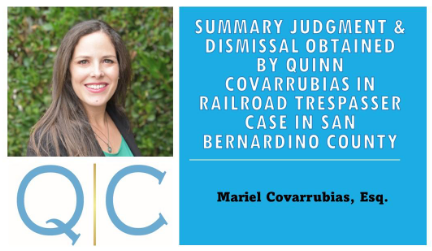Mariel Covarrubias of Quinn Covarrubias obtained a dismissal in a railroad trespasser case in San Bernardino County, California. The wrongful death case was brought by the mother of a man who rode his bicycle onto a private railroad bridge and was hit and killed by a train. His mother sued the railroad company and the locomotive engineer who was operating the train, asserting negligence and premises liability theories. The plaintiff never served the engineer with a summons and complaint, but discovery commenced against the railroad and the City of Colton, who was also named as a defendant.
We moved for summary judgment on behalf of our railroad client on the grounds that the plaintiff lacked standing to sue because she was not the decedent’s lawful heir pursuant to California Code of Civil Procedure Section 377.60(a). Decedent had a son who was named in the lawsuit by the plaintiff as an unwilling plaintiff. Citing Lewis v. Regional Center of the East Bay (1985) 174 Cal.App.3d 350, we argued that the right to maintain an action for wrongful death is restricted to heirs as defined by the intestacy provision of the Probate Code and the right cannot be exercised by one who became an heir by virtue of the heir disclaiming any interest in the estate of the decedent. We also argued that the plaintiff was not entitled to bring suit under subsection (b) of section 377.60 because she was not financially dependent on the decedent. The plaintiff was homeless and failed to come forth with any evidence that her son provided her with necessities of life such as shelter, clothing, food, and medical treatment.
The Court agreed that the plaintiff was not a proper plaintiff since she was neither the lawful heir nor was she financially dependent on her son. The Court rejected the plaintiff’s argument that Code of Civil Procedure section 382 grants plaintiff the right to sue the railroad for the benefit of all family members including the decedent’s biological son. The Court acknowledged that an action for wrongful death is statutory and extends only as far as the Legislature intends. Code of Civil Procedure section 377.60 limits those who can bring a wrongful death action to those persons listed in the statute or to the decedent’s personal representative.
After the railroad defendant was dismissed, Plaintiff made no effort to serve the engineer, but she refused to voluntarily dismiss him. Code of Civil Procedure section 583.210(a) requires a summons and complaint to be served within three years of commencing the action. Upon the expiration of the three year time period to serve, we filed a motion to dismiss the engineer on the grounds that dismissal was mandatory under section 583.210(a). The Court agreed, dismissing the individual defendant and finally ending the case.

